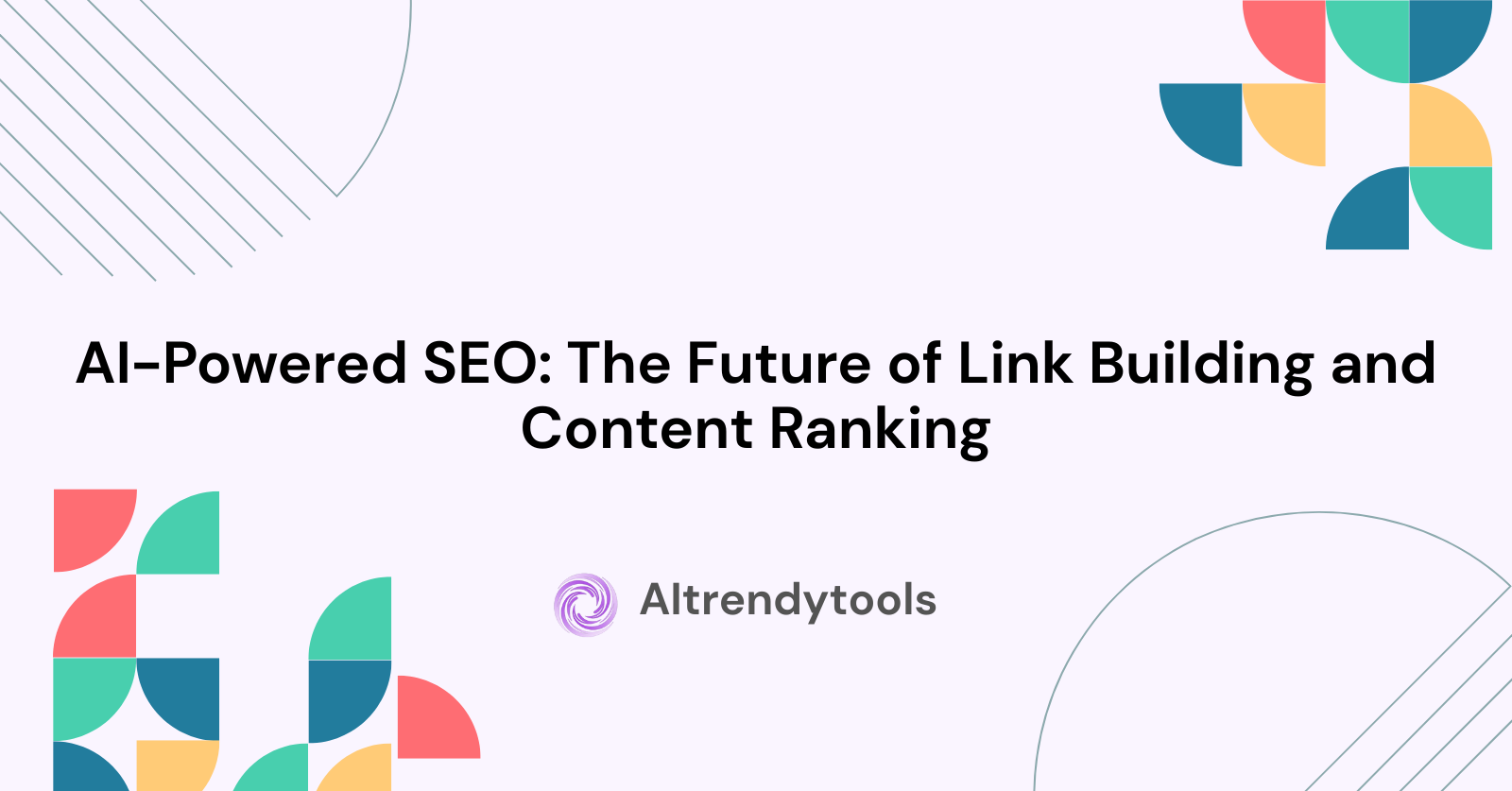🔥 AITrendytools: The Fastest-Growing AI Platform |
Write for usAI-Powered SEO: The Future of Link Building and Content Ranking
Discover how AI is transforming SEO with automated link building, smart content ranking, and predictive strategies. Complete guide to AI SEO tools.
Sep 15, 2025
The digital marketing landscape is experiencing a fundamental transformation as artificial intelligence reshapes how we approach search engine optimization. AI-powered SEO represents the next evolution in digital marketing, combining machine learning algorithms with traditional optimization techniques to create more effective, efficient, and intelligent strategies for improving search rankings and driving organic traffic.
Modern SEO professionals are witnessing unprecedented changes in how search engines evaluate content, understand user intent, and deliver relevant results. Google's advanced AI systems, including RankBrain and BERT, have elevated the importance of content quality, user experience, and semantic understanding. These developments require marketers to adapt their strategies and embrace AI technologies to remain competitive.
The integration of artificial intelligence into SEO workflows offers remarkable opportunities for automation, analysis, and optimization. From intelligent keyword research and content creation to sophisticated link building and performance tracking, AI tools are enabling marketers to achieve better results with greater efficiency. Understanding these technologies and their applications becomes crucial for any business seeking to maintain or improve their search visibility.
Understanding AI-Powered SEO Fundamentals
What Makes AI SEO Different from Traditional Methods
AI-powered SEO differs fundamentally from traditional optimization approaches through its ability to process vast amounts of data, identify complex patterns, and make intelligent predictions about search behavior. Traditional SEO relies heavily on manual analysis, intuition, and historical best practices. AI SEO leverages machine learning algorithms to continuously analyze search trends, user behavior, and ranking factors in real-time.
The technology behind AI SEO encompasses natural language processing, predictive analytics, and automated decision-making systems. These capabilities enable SEO tools to understand content context, predict keyword performance, and optimize strategies based on data-driven insights rather than assumptions or outdated practices.
Key differences include:
- Data Processing Speed - AI analyzes millions of data points simultaneously
- Pattern Recognition - Machine learning identifies trends humans might miss
- Predictive Capabilities - AI forecasts future performance and trends
- Automation Scale - Handles repetitive tasks across massive datasets
- Continuous Learning - Algorithms improve performance over time
Core AI Technologies Transforming SEO
Several artificial intelligence technologies are driving the evolution of SEO practices. Natural language processing enables better understanding of content relevance and user intent. Machine learning algorithms help identify ranking patterns and optimize content strategies. Computer vision technologies assist with image optimization and visual search preparation.
These technologies work together to create comprehensive SEO solutions that adapt to changing search algorithms and user behaviors. AI systems can analyze competitor strategies, identify content gaps, and recommend optimization improvements with unprecedented accuracy and speed.
Fundamental AI technologies include:
- Natural Language Processing for content analysis and optimization
- Machine Learning for pattern recognition and prediction
- Computer Vision for image and video optimization
- Predictive Analytics for forecasting SEO performance
- Automated Decision Making for real-time optimization adjustments
Machine Learning SEO and Algorithm Intelligence
How Search Engines Use AI for Ranking
Search engines have integrated artificial intelligence deep into their ranking algorithms to better understand content quality, user intent, and relevance. Google's RankBrain uses machine learning to interpret search queries and match them with the most relevant content. BERT helps understand the context and nuance of natural language in both queries and content.
These AI systems evaluate hundreds of ranking factors simultaneously, weighing their importance based on query type, user location, search history, and device type. The algorithms continuously learn from user interactions, adjusting rankings based on click-through rates, bounce rates, and engagement metrics.
Search engine AI considerations encompass:
- Query Understanding - Interpreting user intent beyond literal keywords
- Content Relevance - Evaluating topical authority and expertise
- User Experience Signals - Analyzing engagement and satisfaction metrics
- Personalization - Customizing results based on individual user data
- Real-Time Adjustments - Updating rankings based on fresh signals
Adapting SEO Strategies for AI Algorithms
Successful SEO in the AI era requires understanding how machine learning algorithms evaluate content and user experience. Strategies must focus on creating genuinely valuable content that satisfies user intent rather than manipulating traditional ranking factors. This approach aligns with search engines' goals of delivering the best possible results to users.
Modern SEO strategies emphasize semantic relevance, topical authority, and comprehensive content coverage. These factors help AI algorithms understand content quality and relevance more effectively than traditional keyword density or exact match optimization techniques.
Adaptation strategies include:
- Semantic Optimization - Creating content around topics and concepts
- User Intent Focus - Addressing specific user needs and questions
- Content Quality Enhancement - Improving depth, accuracy, and usefulness
- Technical Excellence - Ensuring fast loading and mobile optimization
- Authority Building - Establishing expertise and trustworthiness signals
AI Link Building Strategies and Automation
Intelligent Link Prospecting and Analysis
AI-powered link building revolutionizes how marketers identify, evaluate, and secure backlink opportunities. Machine learning algorithms can analyze millions of websites to identify high-quality link prospects based on relevance, authority, and likelihood of acceptance. This intelligent prospecting saves countless hours while improving link quality and campaign success rates.
Advanced AI tools evaluate potential link partners using sophisticated criteria including domain authority, content relevance, traffic patterns, and historical linking behavior. These systems can predict which outreach strategies are most likely to succeed with specific prospects, enabling more personalized and effective outreach campaigns.
AI prospecting capabilities include:
- Automated Site Discovery - Finding relevant link opportunities at scale
- Quality Assessment - Evaluating domain authority and relevance
- Outreach Personalization - Customizing messages for higher response rates
- Success Prediction - Identifying prospects most likely to link
- Competitive Analysis - Discovering competitor backlink strategies
Automated Outreach and Relationship Building
Artificial intelligence enables sophisticated automation of link building outreach while maintaining the personal touch necessary for successful relationship building. AI systems can craft personalized outreach emails, schedule follow-ups, and track response rates to optimize campaign performance continuously.
Smart automation tools analyze recipient behavior, website content, and communication preferences to create highly targeted outreach messages. These systems learn from successful campaigns, refining their approach to improve response rates and build lasting professional relationships.
Automation features encompass:
- Personalized Email Generation - Creating unique messages for each prospect
- Follow-Up Scheduling - Timing communications for optimal response
- Response Tracking - Monitoring campaign performance and adjustments
- Relationship Management - Maintaining ongoing prospect communications
- Performance Optimization - Improving strategies based on data analysis
AI Content Optimization and Ranking Factors
Intelligent Content Creation and Enhancement
AI-powered content optimization transforms how marketers create, enhance, and distribute content for maximum search visibility. Advanced AI tools can analyze top-ranking content, identify optimization opportunities, and recommend improvements that align with search engine preferences and user expectations.
These systems evaluate content across multiple dimensions including readability, topical coverage, semantic relevance, and user engagement potential. AI content tools can suggest related topics, optimize heading structures, and recommend internal linking strategies to improve content performance.
Content optimization features include:
- Topic Research - Identifying trending and relevant content themes
- Semantic Enhancement - Improving content relevance and context
- Readability Optimization - Adjusting content for target audience comprehension
- Structure Improvement - Organizing content for better user experience
- Performance Prediction - Forecasting content ranking potential
Real-Time Content Performance Analysis
Artificial intelligence enables continuous monitoring and optimization of content performance across multiple metrics and search queries. AI systems can track rankings, traffic, engagement, and conversion metrics in real-time, providing actionable insights for content improvement and optimization.
These tools identify content that's losing rankings, discover new keyword opportunities, and recommend updates to maintain or improve search performance. Real-time analysis helps marketers respond quickly to algorithm changes and competitive threats.
Performance analysis capabilities encompass:
- Ranking Monitoring - Tracking position changes across keywords
- Traffic Analysis - Understanding organic search performance trends
- Engagement Tracking - Measuring user interaction and satisfaction
- Competitive Monitoring - Comparing performance against competitors
- Optimization Recommendations - Suggesting improvements based on data
AI SEO Tools and Technology Platforms
Essential AI-Powered SEO Software
The SEO industry offers numerous AI-powered tools designed to streamline optimization workflows and improve campaign effectiveness. These platforms integrate machine learning capabilities with traditional SEO functions to provide comprehensive solutions for keyword research, content optimization, link building, and performance tracking.
Leading AI SEO tools combine multiple functionalities into unified platforms that can manage entire optimization campaigns. These solutions offer predictive analytics, automated reporting, and intelligent recommendations that help marketers make data-driven decisions about their SEO strategies.
Popular AI SEO tool categories include:
- All-in-One Platforms - Comprehensive SEO management solutions
- Content Optimization Tools - AI-powered writing and enhancement software
- Link Building Platforms - Automated prospecting and outreach systems
- Keyword Research Tools - AI-driven keyword discovery and analysis
- Performance Analytics - Advanced tracking and reporting platforms
For businesses seeking cutting-edge AI SEO solutions, platforms like those featured on AItrendytools provide comprehensive reviews and comparisons of the latest AI-powered marketing technologies.
Choosing the Right AI SEO Technology Stack
Selecting appropriate AI SEO tools requires careful consideration of business needs, budget constraints, and technical requirements. Different tools excel in specific areas, and the most effective approach often involves combining multiple specialized solutions rather than relying on a single platform.
Evaluation criteria should include accuracy of AI predictions, ease of integration with existing workflows, scalability for future growth, and quality of customer support. The best AI SEO tools provide transparent insights into their algorithmic approaches and offer customization options for specific industry needs.
Selection considerations encompass:
- Feature Requirements - Identifying essential vs. nice-to-have capabilities
- Integration Needs - Ensuring compatibility with existing tools
- Scalability Planning - Choosing solutions that grow with business needs
- Budget Allocation - Balancing cost with expected return on investment
- Training Requirements - Assessing team learning curves and support needs
Predictive SEO and Future Trend Analysis
Using AI for SEO Forecasting and Planning
Predictive SEO represents one of the most powerful applications of artificial intelligence in digital marketing. AI systems can analyze historical data, current trends, and competitive activities to forecast future search behavior, ranking opportunities, and content performance. This predictive capability enables marketers to plan strategies proactively rather than reactively.
Advanced forecasting models consider multiple variables including seasonal trends, algorithm updates, competitive landscape changes, and emerging topics. These predictions help businesses allocate resources more effectively and capitalize on opportunities before competitors recognize them.
Predictive capabilities include:
- Keyword Trend Forecasting - Predicting future search volume changes
- Ranking Opportunity Identification - Finding underexploited keywords
- Content Performance Prediction - Estimating traffic potential before publication
- Competitive Threat Assessment - Anticipating competitor strategy changes
- Algorithm Impact Modeling - Preparing for search engine updates
Emerging Trends in AI-Driven SEO
The future of SEO will be increasingly dominated by artificial intelligence applications that we're only beginning to understand. Voice search optimization, visual search preparation, and entity-based SEO represent emerging areas where AI will play crucial roles. These trends require marketers to expand their skill sets and adopt new optimization approaches.
Understanding emerging trends allows businesses to prepare for future search landscape changes. Early adoption of new AI technologies often provides competitive advantages as search engines evolve their algorithms and user behavior shifts toward new interaction modes.
Future trends encompass:
- Voice Search Optimization - Adapting content for conversational queries
- Visual Search Preparation - Optimizing images and videos for AI recognition
- Entity-Based SEO - Building authority around specific topics and concepts
- Personalization Enhancement - Creating individualized user experiences
- Cross-Platform Integration - Unifying SEO across multiple digital channels
AI SEO Implementation and Best Practices
Getting Started with AI-Powered SEO
Implementing AI-powered SEO requires a strategic approach that balances automation with human oversight. Organizations should begin by identifying specific pain points in their current SEO workflows and selecting AI tools that address these challenges effectively. Starting with pilot projects allows teams to learn AI capabilities without overwhelming existing processes.
Successful implementation involves training team members on AI tool capabilities, establishing data quality standards, and creating feedback loops that improve AI performance over time. The goal is to enhance human expertise with artificial intelligence rather than replacing skilled SEO professionals entirely.
Implementation steps include:
- Current State Assessment - Evaluating existing SEO processes and challenges
- Tool Selection and Testing - Choosing appropriate AI solutions for specific needs
- Team Training and Development - Building AI literacy among SEO professionals
- Process Integration - Incorporating AI tools into existing workflows
- Performance Measurement - Tracking AI implementation success and ROI
Measuring AI SEO Success and ROI
Measuring the effectiveness of AI-powered SEO requires establishing clear metrics that demonstrate both process improvements and business outcomes. Traditional SEO metrics remain important, but AI implementations also require tracking efficiency gains, accuracy improvements, and time savings achieved through automation.
Comprehensive measurement frameworks should evaluate both quantitative results like ranking improvements and traffic increases, as well as qualitative benefits such as improved team productivity and decision-making accuracy. Regular assessment ensures AI investments deliver expected returns and identifies areas for optimization.
Success metrics encompass:
- Ranking Performance - Tracking position improvements across target keywords
- Organic Traffic Growth - Measuring increases in search-driven website visits
- Conversion Rate Optimization - Improving visitor-to-customer conversion rates
- Process Efficiency - Quantifying time and resource savings from automation
- Competitive Advantage - Assessing market position improvements
Advanced AI SEO Strategies and Techniques
Enterprise-Level AI SEO Implementation
Large organizations require sophisticated AI SEO strategies that can scale across multiple websites, product lines, and geographic markets. Enterprise implementations often involve custom AI solutions, advanced data integration, and complex workflow automation that goes far beyond basic tool adoption.
Enterprise AI SEO strategies must consider organizational structure, resource allocation, and change management requirements. These implementations typically require dedicated teams, substantial technology investments, and long-term commitment to AI-driven optimization approaches.
Enterprise considerations include:
- Scalability Planning - Designing systems for large-scale implementation
- Data Integration - Connecting AI tools with existing business systems
- Team Structure - Organizing resources for AI SEO management
- Technology Infrastructure - Building platforms to support AI capabilities
- Governance Frameworks - Establishing guidelines for AI tool usage
Advanced AI Techniques for Competitive Advantage
Cutting-edge AI SEO techniques involve sophisticated applications of machine learning, natural language processing, and predictive analytics. These advanced approaches often require custom development, specialized expertise, and significant technology investments but can provide substantial competitive advantages for organizations willing to invest in innovation.
Advanced techniques may include custom AI model development, proprietary data analysis, and experimental optimization approaches that push the boundaries of current SEO best practices. These strategies are typically most appropriate for organizations with substantial SEO budgets and technical capabilities.
Advanced techniques encompass:
- Custom AI Model Development - Building proprietary optimization algorithms
- Advanced Data Science - Applying sophisticated analytics to SEO data
- Experimental Optimization - Testing cutting-edge SEO approaches
- Cross-Channel Intelligence - Integrating SEO with other marketing channels
- Predictive Modeling - Developing custom forecasting capabilities
Common AI SEO Challenges and Solutions
Overcoming Implementation Obstacles
Organizations implementing AI-powered SEO often encounter challenges related to data quality, tool integration, team training, and result interpretation. These obstacles can slow adoption and reduce the effectiveness of AI implementations if not addressed proactively through proper planning and change management.
Common implementation challenges include resistance to change, inadequate data preparation, unrealistic expectations about AI capabilities, and insufficient technical support. Successful organizations address these challenges through comprehensive planning, stakeholder education, and gradual implementation approaches.
Implementation solutions include:
- Change Management - Preparing teams for AI adoption and workflow changes
- Data Quality Improvement - Ensuring clean, accurate data for AI analysis
- Realistic Expectation Setting - Educating stakeholders about AI capabilities and limitations
- Technical Support Planning - Providing adequate resources for tool implementation
- Gradual Rollout Strategies - Implementing AI tools in phases to manage complexity
Avoiding AI SEO Pitfalls and Mistakes
AI-powered SEO implementations can fail when organizations over-rely on automation, ignore human oversight requirements, or misunderstand AI tool capabilities. Common mistakes include expecting immediate results, failing to validate AI recommendations, and neglecting the importance of strategic human input in optimization decisions.
Avoiding these pitfalls requires maintaining balance between automation and human expertise, understanding AI limitations, and implementing proper quality control processes. The most successful AI SEO implementations combine machine intelligence with human creativity and strategic thinking.
Common pitfalls encompass:
- Over-Automation - Relying too heavily on AI without human oversight
- Inadequate Validation - Failing to verify AI recommendations before implementation
- Unrealistic Timelines - Expecting immediate results from AI implementations
- Poor Data Management - Using low-quality data that produces inaccurate AI insights
- Insufficient Monitoring - Failing to track AI performance and make necessary adjustments
The Future Landscape of AI-Powered SEO
Predictions for AI SEO Evolution
The next decade will bring revolutionary changes to SEO as artificial intelligence becomes more sophisticated and widely adopted. Search engines will likely integrate more advanced AI capabilities, requiring marketers to adapt their strategies accordingly. Voice search, visual search, and personalized results will become increasingly important ranking factors.
Future AI SEO tools will likely offer more sophisticated predictive capabilities, better integration across marketing channels, and enhanced automation features. The most successful organizations will be those that embrace these changes early and build AI capabilities into their core SEO strategies.
Future developments include:
- Enhanced Personalization - AI delivering individualized search experiences
- Advanced Automation - More sophisticated automated optimization capabilities
- Cross-Channel Integration - AI connecting SEO with other marketing activities
- Improved Prediction Accuracy - Better forecasting of SEO performance and trends
- Simplified Implementation - More user-friendly AI tools requiring less technical expertise
Preparing for the AI-First SEO Future
Organizations seeking long-term SEO success must begin preparing now for an AI-first future. This preparation involves building AI literacy among team members, investing in appropriate technology infrastructure, and developing strategies that embrace rather than resist artificial intelligence integration.
Preparation strategies should focus on developing capabilities that complement AI rather than compete with it. Human creativity, strategic thinking, and relationship building will remain crucial even as AI handles more technical and analytical tasks.
Preparation strategies encompass:
- Skill Development - Building AI literacy and technical capabilities
- Technology Investment - Upgrading infrastructure to support AI tools
- Strategic Planning - Developing long-term AI integration roadmaps
- Partnership Building - Creating relationships with AI technology providers
- Continuous Learning - Staying current with AI SEO developments and best practices
Frequently Asked Questions
How does AI improve traditional SEO processes?
AI enhances traditional SEO by automating time-consuming tasks, analyzing larger datasets more accurately, and identifying patterns that humans might miss. This leads to more efficient keyword research, better content optimization, and more effective link building strategies.
What are the most important AI SEO tools to consider?
Essential AI SEO tools include comprehensive platforms for keyword research and content optimization, automated link building systems, and predictive analytics software. The best tools for your organization depend on specific needs, budget, and technical capabilities.
How quickly can businesses see results from AI SEO implementation?
Results from AI SEO implementation vary depending on the current state of optimization, competitive landscape, and implementation scope. While some improvements may be visible within weeks, significant results typically require 3-6 months of consistent AI-powered optimization efforts.
What skills do SEO professionals need for AI integration?
SEO professionals need to develop data analysis skills, understand AI tool capabilities and limitations, and learn to interpret machine learning insights. Technical skills become more important, but strategic thinking and creativity remain crucial for success.
How much should businesses invest in AI SEO tools?
AI SEO tool investments should align with business goals, current SEO spending, and expected returns. Organizations can start with affordable tools and scale investments as they demonstrate value and develop AI capabilities within their teams.
Will AI replace human SEO professionals?
AI will not replace human SEO professionals but will change their roles significantly. Professionals who embrace AI tools and develop complementary skills will find themselves more valuable, while those who resist change may struggle to remain competitive.
Conclusion: Embracing the AI-Powered SEO Revolution
AI-powered SEO represents the most significant advancement in digital marketing optimization since the advent of search engines themselves. Organizations that embrace artificial intelligence technologies will gain substantial competitive advantages through improved efficiency, better decision-making, and enhanced optimization capabilities that drive superior search performance and business results.
The transformation from traditional to AI-powered SEO requires strategic planning, appropriate technology investments, and commitment to continuous learning and adaptation. Success depends on balancing automation with human expertise, understanding AI capabilities and limitations, and implementing tools that genuinely improve optimization outcomes rather than simply following technological trends.
The future belongs to organizations that view AI as an enhancement to human capabilities rather than a replacement for strategic thinking and creativity. By combining the analytical power of artificial intelligence with human insight and experience, businesses can achieve SEO results that neither humans nor machines could accomplish independently.
Companies seeking to explore the latest AI SEO technologies and tools can find comprehensive resources and reviews at AItrendytools, helping them make informed decisions about their AI-powered optimization investments and strategies.
The AI-powered SEO revolution is not coming – it is already here. Organizations that act now to build AI capabilities and integrate intelligent tools into their optimization workflows will be best positioned to thrive in the increasingly competitive digital landscape of the future.
🚀 Submit Your Tool to Our Comprehensive AI Tools Directory
Get your AI tool featured on our complete directory at AITrendytools and reach thousands of potential users. Select the plan that best fits your needs.





Join 30,000+ Co-Founders
Related Blogs
Maharashtra Times: Maharashtra's #1 Marathi Newspaper
Maharashtra Times (मटा) is Maharashtra's #1 Marathi newspaper since 1962. Read today's ePaper, download the free app & get live news from Mumbai, Pune & beyond.
MovieSwap: The Bold Idea to Free Every Movie Ever Made
MovieSwap wanted to let you stream any movie ever made legally. Discover why this bold Kickstarter idea failed and what it means for film fans today.
RapiCredit Review 2026: Fast Loans in Colombia?
Get cash fast with RapiCredit Colombia's top fintech lender. See real rates, requirements & honest reviews before you apply. Is it right for you in 2026?
Submit Your Tool to Our Comprehensive AI Tools Directory
List your AI tool on AItrendytools and reach a growing audience of AI users and founders. Boost visibility and showcase your innovation in a curated directory of 30,000+ AI apps.





Join 30,000+ Co-Founders

